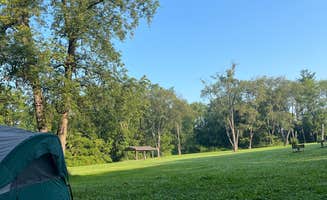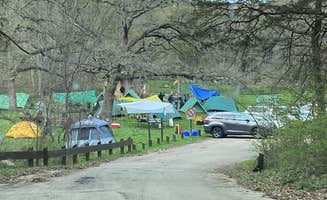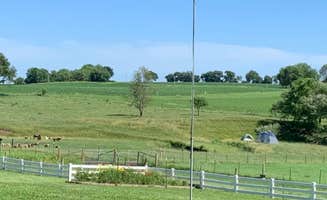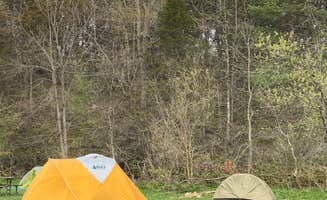Cherry Valley's surrounding woodlands offer primitive tent camping opportunities less than 100 miles west of Chicago. The area features a mix of prairie ecosystems and forested landscapes with elevations ranging from 700 to 900 feet. Summer temperatures typically reach 80°F during the day while dropping to the mid-60s at night, creating comfortable conditions for overnight camping experiences.
What to do
Paddling adventures: Castle Rock State Park provides river-based recreation along the Rock River, known by Native Americans as Sinnissippi, meaning 'Rocky Waters.' Visitors can launch kayaks or canoes for day trips. "From the launch, the canoe campground is approximately 2 miles south down river, located on the west bank. It's a beautiful and easy paddle to the sites," notes Jessica W. about Castle Rock State Park Campground.
Hiking options: Explore multiple trail systems with varying difficulty levels. "If you've come this way to do some decent hiking, with more than 6 miles of moderate landscape, you'll be rewarded for finding this place off the beaten path," writes Stuart K. about Castle Rock. The trails convert to cross-country skiing routes during winter months.
Wildlife viewing: The region's forests and waterways support diverse wildlife watching opportunities. "If you're a bird watcher, you'll enjoy the flycatchers, warblers, and woodpeckers, vireos as well as barn and horned-rim owls," reports Stuart K. about Franklin Creek State Natural Area Equestrian Campground, which offers 882 acres of prairieland just northwest of Cherry Valley.
What campers like
Secluded sites: Campers appreciate the privacy found at primitive tent camping locations. "There are only 9 sites total. VERY private and secluded. Tents only! Massive forest preserve area for excellent hiking," notes Marisa A. about Lutheran Outdoor Ministries Center, which offers 640 acres of meadow, forest, and stocked pond.
Riverside locations: Waterfront camping provides unique overnight experiences. Brian O. explains about Castle Rock: "Since all sites are on the riverbank and there's a state forest across the river, you really do feel like you're away from it all." The constant sound of flowing water adds to the camping atmosphere.
Night skies: Areas away from light pollution offer stargazing opportunities. Amy G. notes about MacQueen Forest Preserve: "About half of the campsites are in a meadow at the back end of the campground. It would be beautiful for stargazing!" The open meadow areas provide clear views of constellations on cloudless nights.
What you should know
Paddling challenges: Return trips against current require planning. "Paddling back up river was not easy, but it was not impossible. It took approximately 3 hours, allowing for a few breaks to rest," writes Jessica W. about Castle Rock State Park Campground. Campers should assess their physical abilities before attempting upstream return journeys.
Train noise: Some campgrounds experience railroad disruptions. According to Amy G. at MacQueen Forest Preserve: "Note: if you cannot sleep to the sound of trains at night, this is not the campground for you. I don't mind them at all, and rather enjoy the sound, but there were probably three of them that went by in the middle of the night rather close to the campground."
Limited water access: Many primitive sites lack potable water. Marcus D. reports about MacQueen Forest Preserve: "I stayed one night and I really enjoyed myself. There wasn't anyone there. I assume it's because it's early in the spring... There isn't much in terms of hiking trails. Just the main path and a few paths connecting sites and sort of a path along the river."
Tips for camping with families
Pack plenty of water: Due to limited facilities, bring sufficient drinking water. Rosa G. advises about Castle Rock: "Be aware that the sites cost $6. I didn't know this despite looking online and calling for info, I only had $5. Carry cash to leave in the envelope." Planning ahead prevents unexpected challenges.
Consider seasonal timing: Spring camping offers fewer crowds but variable conditions. "I stayed one night and I really enjoyed myself. There wasn't anyone there. I assume it's because it's early in the spring," notes Marcus D. about MacQueen Forest Preserve. Shoulder seasons provide more solitude but may require extra preparedness.
Explore historical sites: The region offers educational opportunities beyond camping. "What you'll enjoy most about being here, apart from the peace & quiet as well as the abundance of serenity is that this place has a really nice connection with history as it features a fully functioning grist mill," explains Stuart K. about Franklin Creek State Natural Area Equestrian Campground.
Tips for RVers
Limited RV options: Most tent camping near Cherry Valley focuses on primitive sites unsuitable for large vehicles. "This is where to go if you don't like pitching a tent in a field of RVs," notes Marisa A. about Lutheran Outdoor Ministries Center, one of the few locations accommodating both tents and RVs.
Consider equipment transport: Primitive sites often require hauling gear from parking areas. Nick C. describes MacQueen Forest Preserve: "Spots are pretty spread out. Only sites 1,2,8 are forested the rest are around a large open field." Prepare appropriate carrying equipment for transporting supplies from vehicles.
Plan for waste disposal: Most primitive sites lack dump stations. Darshon J. notes about MacQueen Forest Preserve: "Well maintained bathrooms, great secluded sites. Super easy no registration its first come first serve." Understanding limited facilities helps RVers plan appropriately for waste management needs.






